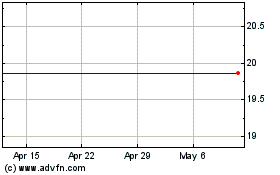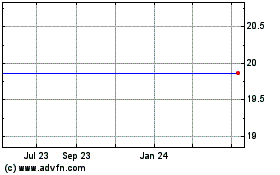A powerful federal committee blessed China National Chemical
Corp.'s $43 billion planned takeover of seed giant Syngenta AG,
months after shooting down much smaller Chinese deals for
electronics and lightbulb manufacturers.
The decision indicates that potential worries about the
long-term security of the American agricultural industry resonate
far less than immediate concerns over foreign ownership of
technology and cybersecurity assets, according to lawyers who work
on foreign-driven merger deals.
The Committee on Foreign Investment in the U.S., or CFIUS, a
Treasury-led panel that can scotch mergers over national-security
concerns, has approved multibillion-dollar deals putting swaths of
U.S. food production under Chinese ownership in the past three
years.
State-owned ChemChina's planned purchase of Syngenta, which
supplies about one-fifth of the world's pesticides and about 10% of
soybean seeds to U.S. farmers, would rank as Beijing's biggest-ever
overseas deal. Swiss-based Syngenta generates about one-quarter of
its sales from North America.
"They've not yet reached the point where they have found an
acquisition in the food and agriculture sector to threaten national
security," said Stephen McHale, a partner at Squire Patton Boggs
who has helped shepherd deals through the CFIUS process. The body's
rulings reflect a view that the U.S. is "very secure in its food
supply."
But CFIUS has emerged as a key hurdle for Chinese firms looking
to acquire technologies.
If national-security concerns are found, CFIUS can recommend
that companies modify their deal or divest U.S. assets. It can also
recommend that the U.S. president block the deal, though typically
companies will abandon transactions before then. CFIUS has the
ability to review any deals that result in change of control of a
business operating in the U.S., even if it is part of a company
based abroad.
In January, Philips NV said it would drop a $2.8 billion deal to
sell its Lumileds LED lightbulb business to an investment fund led
by Chinese venture-capital firm GSR Ventures, following undisclosed
concerns from CFIUS.
Fairchild Semiconductor International Inc. opted in February to
turn down a bid from China Resources Microelectronics Ltd. and Hua
Capital Management Co. in favor of an existing deal to be bought by
Arizona-based ON Semiconductor Corp. Fairchild cited the risk of a
failure to obtain CFIUS approval.
Also in February, Western Digital Corp. said Beijing-based
Unisplendour Corp. terminated a plan to buy a 15% stake in the disk
drive maker for $3.78 billion after the committee informed the
companies it would investigate the transaction.
CFIUS includes representatives from 16 U.S. departments and
agencies, including the Treasury, Homeland Security and Defense
departments. Its deliberations are confidential, and some regard
the process as opaque.
Its approval of the ChemChina-Syngenta deal, as well as the 2013
sale of U.S. pork giant Smithfield Foods Inc. to China's WH Group
Ltd., suggests a different view of the technology that goes into
breeding and processing hogs for pork chops and developing corn
plants capable of repelling pests, say lawyers familiar with the
CFIUS process.
Syngenta and ChemChina announced the CFIUS approval Monday but
didn't comment on any conditions required by the committee. A
spokeswoman for the Treasury Department declined to comment on the
Syngenta deal or CFIUS's attitude toward China.
Erik Fyrwald, Syngenta's chief executive, said the deal would
benefit farmers and crop production globally by placing Syngenta
under ownership of a deep-pocketed company that will support
long-term investments in research. "The interests of China and U.S.
agriculture are aligned in this deal," he said.
Some lawmakers and farm groups continued to warn on Monday of
longer-range threats to U.S. agriculture as China—among the world's
top buyers of agricultural commodities—absorbs more of the
technology that has made the U.S. the largest global producer of
corn, soybeans, beef and chicken meat.
Bringing Syngenta into the portfolio of ChemChina is also
expected to spur China's adoption of genetically modified crops and
other agricultural advances as the country strives to become more
food secure.
"The fact that a [Chinese] state-owned enterprise may have yet
another stake in U.S. agriculture is alarming," said Sen. Charles
Grassley (R., Iowa). Mr. Grassley in July introduced a bill that
seeks a permanent spot on CFIUS for the U.S. Department of
Agriculture to scrutinize deals for food-security threats, and in
April joined other senators calling for deeper scrutiny of the
ChemChina-Syngenta deal.
"Chinese investments in the United States often attract close
scrutiny not only from CFIUS but also from the media, the Congress
and industry competitors, all of whom have different agendas," said
Mark Plotkin, who works on CFIUS cases in Washington at law firm
Covington & Burling LLP.
Some U.S. farm groups remained cautious that ownership under
ChemChina could give Syngenta advantages over rivals in China. The
country is a potentially massive market for agricultural products
that has yet to fully allow foreign-based firms to compete
domestically, and which has yet to deeply embrace genetically
engineered crops. Syngenta officials have said they don't
anticipate any special treatment there.
Yet securing the CFIUS nod on Monday sends a positive signal for
a mergers-and-acquisitions market that has been buoyed by China,
and closely watched by bankers and executives of U.S.
companies.
Chinese firms have struck about $160 billion worth of foreign
takeover deals so far this year, far greater than any full year on
record, according to Dealogic.
Approval from CFIUS may not mean that ChemChina's deal for
Syngenta is free and clear.
The transaction still requires approval by antitrust authorities
in the European Union and the U.S. who will examine the combination
of Syngenta and ChemChina, given ChemChina's ownership in Israeli
pesticide manufacturer Adama Agricultural Solutions Ltd., though
that company mainly focuses on generic products.
Lawmakers could also keep up pressure on the deal. When Dubai
Ports World in 2005 moved to buy U.S. shipping ports on the East
Coast, CFIUS initially approved the transaction, but a campaign by
U.S. senators and others concerned about national security later
led to the deal's collapse.
Don Clark contributed to this article.
Write to Jacob Bunge at jacob.bunge@wsj.com, Brian Spegele at
brian.spegele@wsj.com and William Mauldin at
william.mauldin@wsj.com
(END) Dow Jones Newswires
August 22, 2016 21:35 ET (01:35 GMT)
Copyright (c) 2016 Dow Jones & Company, Inc.
Fairchild Semiconductor (NASDAQ:FCS)
Historical Stock Chart
From Dec 2024 to Jan 2025

Fairchild Semiconductor (NASDAQ:FCS)
Historical Stock Chart
From Jan 2024 to Jan 2025
